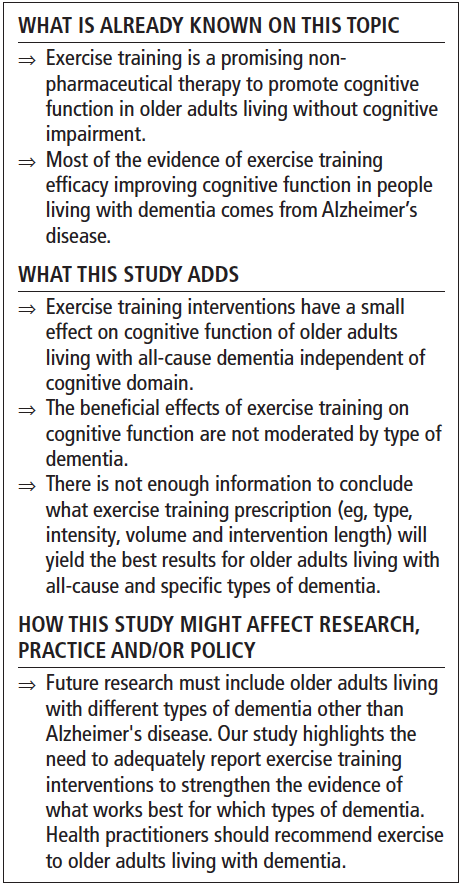Part of the BJSM’s #KnowledgeTranslation blog series
This study looked to assess the effect of exercise training on the cognitive function of older adults living with different types of dementia, as well as potential moderators of exercise efficacy. We break it down in an easy-to-read format so that you can implement these findings practically in your work settings.
Why is this study important?
Dementia is an umbrella term for a variety of brain diseases or conditions that negatively impact our thinking abilities (e.g., memory, ability to keep and change attention on tasks). Dementia is one of the leading causes of death in the world, and more than 150 million people will be living with dementia by 2050. Alzheimer’s disease is the most common type, followed by vascular dementia.
Currently, there are no accessible and effective drug therapies to delay the onset, avoid progression, or treat any type of dementia. Thus, there is much interest in identifying effective non-drug approaches. Physical activity in the form of exercise training is one of the most promising strategies. Exercise training is physical activity performed in a planned, structured, and repetitive fashion in one’s discretionary time.
Whether exercise can improve thinking abilities in older adults living with dementia is unclear because previous findings are inconsistent. To provide greater clarity, we systematically searched for relevant studies and applied statistical analyses to collate and summarize their results. We thought that exercise would promote thinking abilities for older adults living with dementia. Also, we believed that the characteristics of exercise, type of dementia, and individual characteristics (e.g., age, sex) would either magnify or diminish the effects of exercise.
How did the study go about this?
We chose a set of keywords and searched for studies in the most common online libraries of scientific articles. We had a set of criteria for studies to be included: 1) participants were randomly assigned to an exercise training group or a group doing non-exercise activities; 2) studies were published in scientific journals in English; 3) participants had to be 60 years old or more and have dementia; 4) the exercise training program had to be at least 8-week long; and 5) thinking abilities were measured before and after the training.
Two team members examined each study and decided whether their methodology aligned with the established inclusion criteria. After we had a final set of studies matching our criteria, we extracted relevant information, including characteristics of the participants, type of exercise program, and tests used to measure thinking skills. Finally, we performed a combined analysis assessing the effect of exercise on thinking skills across all studies.
What did the study find?
Our search initially identified 13,674 potential studies. Only 28 of those met our inclusion criteria. Nine studies included only people living with Alzheimer’s disease, two with vascular dementia, 11 with different types of dementia (e.g., Alzheimer’s disease, vascular dementia, mixed dementia), and six did not specify the type of dementia. These studies accounted for 2,158 people living with dementia with an average age of 81 years. The studies included many types of exercise programs, including aerobic exercise (e.g., walking, cycling), strength training (e.g., lifting weights), more than one type of exercise (e.g., walking and lifting weights), and other forms of exercise (e.g., yoga, Tai Chi).
Our statistical analyses showed that exercise training programs – regardless of their type, frequency, duration, and intensity – had small but significant benefits to the thinking abilities of people living with dementia. Importantly, the

benefits were similar for all people regardless of their age, biological sex, or the type of dementia they had.
Many studies were unclear about the type of dementia their participants were living with or included participants with many types of dementia, preventing us from examining whether exercise training is more beneficial for a specific type of dementia. In addition, several studies did not provide full details of their exercise programs, making it difficult to make precise exercise recommendations for older adults living with dementia.
What are the key take-home points?
Exercise training offers modest improvements in the thinking abilities of older adults living with dementia. However, to reap the cognitive benefits of exercise training for older adults living with dementia, more studies are needed that examine the different parameters of exercise (type, frequency, duration, and intensity) and their effects on thinking abilities. Studies also need to describe the exercise training programs in greater detail. Nevertheless, our results are promising since 1) dementia entails a chronic decline in thinking skills and 2) there is no effective drug therapy for dementia currently available.
Reference: , et al. Effects of exercise training on the cognitive function of older adults with different types of dementia: a systematic review and meta-analysis.
Authors as per the original paper: https://bjsm.bmj.com/content/early/2022/05/15/bjsports-2021-104955